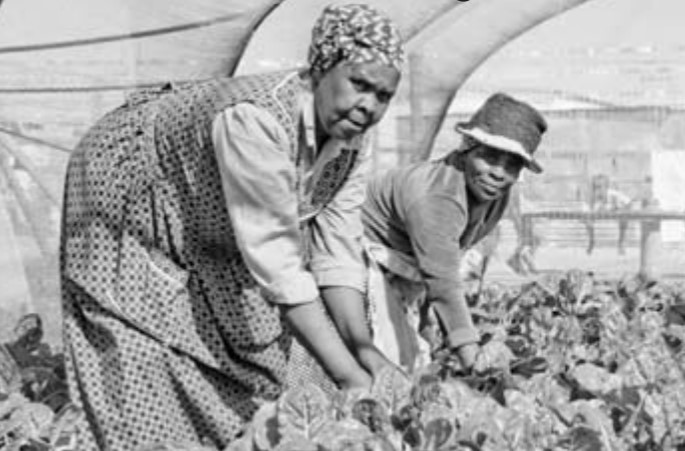Program sets out to help people and the environment
Mandla, 61, and Nqevu, 63, are part of an urban green renewal project, which was launched in April in their community, Samora Machel, a section of Philippi township, about 30 kilometers outside of Cape Town.
The project is run by non-governmental organization (NGO) Green Communities and promotes social upliftment through sustainable green living environments in low-income housing settlements.
Although it will probably take at least a year for the project to reach its full economic potential, Mandla, a grandmother and caregiver of three, says she has already benefited from her membership: “My life is easier than before. I have learned how to garden and now also have my own food garden behind my house. My family eats more vegetables now, not only starch.”
The women, who, aside from gardening, also make money from tailoring, beadwork and recycling, say that since the project started they have more money in their pockets at the end of each month. “For the first time, I can afford to buy electricity. Before, I never had it,” noted Nqevu.
Under the motto “a healthy environment – a healthy community”, Green Communities has developed projects that the NGO claims have significant benefits for both the environment and communities, including climate change mitigation, beautifying the area, enhancing people’s health, providing food and ultimately improving income opportunities for residents.
“We believe that social development and environmental living have to go hand in hand to be effective. Social efforts are not sustainable without environmental elements,” says Green Communities founder Beth McKellar-Bassett. “If both are combined, we see an immediate impact on people’s wellbeing, safety and crime [reduction].”
The kinds of projects that were eventually launched in Samora Machel were up to community members, however. The NGO organized numerous meetings in the beginning of the year where residents could discuss what their biggest needs were and what initiatives they would like to pursue.
“The two main things people said they wanted were income and food security,” McKellar-Bassett recalls, adding that “you have to ask the community what they want, otherwise [even] the best idea will fail.”
Shortly thereafter, Green Communities and a group of 35 residents started an urban agriculture project. They grow various organic vegetables, like spinach, lettuce, spring onions and beetroot, in netted food tunnels. The harvest will be sold to upmarket restaurants in Cape Town that are willing to pay a good price for high-quality produce.
“If the veggie tunnels are well managed, they will make us between R200,000 ($26,500) and R300,000 ($41,500) profit a year,” said McKellar-Bassett. Some of the earnings will be ploughed back into the program, while the rest will be shared equally between the members of the project.
Green Communities is also about to launch a recycling and waste management swap shop in Samora Machel, where residents can exchange glass, plastics and paper for general household items and clothing. In addition, the NGO will run two six-week waste management courses for a total of 60 people.
The newly learned skills will be turned into jobs at Waste Plan, the largest on-site waste management company in South Africa’s Western Cape province, which has promised to employ everyone who successfully finishes the course. “We hope this will help to kick-start job creation in the community,” says McKellar-Bassett.
To green the area and increase the quality of residents’ lives, the NGO has also been planting indigenous trees and plants in all high schools, primary schools and early childhood development centers in Samora Machel. Moreover, the children learn how to grow Spekboom, the Afrikaans name for Portulacaria afra, a succulent tree known for its enormous carbon-storing capabilities.
The NGO also helps communities to establish parks, home gardens and food gardens as well as organic composting and worm farms.
To make all these urban green renewal projects sustainable, Green Communities works in close cooperation with several municipal departments, including social development, economic development, housing and city parks.
Cindy Jacobs, program manager for sustainable livelihoods and greening at the City of Cape Town’s environmental resource management department, says these partnerships are crucial to make the projects sustainable: “It’s about doing things differently, about working together instead of in silos.”
Jacobs’ department mainly assists the Samora Machel project with environmental education for school children and community groups. “By teaching residents about biodiversity, water, waste and energy, we build a foundation. They understand the importance of environmental issues and are keen to get involved,” explains Jacobs.
Researcher Mercy Brown-Luthango from the African Centre for Cities, an urban research program at the University of Cape Town, believes close cooperation between municipalities, NGOs and communities is an important new trend for urban greening and social upliftment initiatives.
Community consultation is one of the key aspects to create sustainability. Brown–Luthango said, “Pulling off urban renewal projects takes a lot of time and investment. Low-income communities can’t do it on their own, but they certainly have a lot of assets and skills that they can contribute.”
The ultimate goal is to have communities drive their own urban green renewal projects, with support from NGOs and municipalities.
The next couple of years will show if the Samora Machel project will manage to bring sustainable, long-term change to the community. This will largely depend on the team’s ability to create a well-oiled supply and demand chain for its vegetables.
In the past, numerous well-intentioned urban agriculture projects have failed, largely because farmers did not have access to markets in central areas to sell their fresh produce at a profit.
Originally published by Inter Press Service




